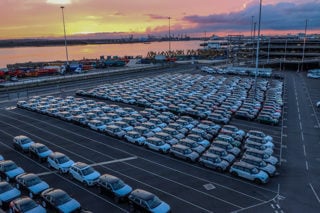By Olivia Bridge, political correspondent, Immigration Advice Service
A recent report by The Society of Motor Manufacturers and Traders (SMMT) reveals how vital the automotive sector is to a prosperous UK economy with contribution reaching over £20 billion.
Last year, the manufacturing sector turned over a record-breaking £82 billion, marking the automotive industry as the UK’s largest manufacturing export sector.
This is due to the hands of its 814,000 employees, including some of the world’s most-skilled and valuable automotive engineers recruited from the EU and beyond.
However, the UK’s departure from the EU is fast approaching with little over six months until the deadline to go.
While EU citizens currently living in the UK and entering up to the end of the implementation period in 2020 can rest assured that they will gain ‘Settled Status’ in the UK, many employers and recruiters in the automotive industry are becoming increasingly concerned with how Brexit will affect their future workforce and recruiting pools.
In a bid to ease concerns, the UK government produced a patchy blueprint document outlining the UK’s economic landscape post-Brexit.
The White Paper assured the UK is set to depart from Free Movement and the Single Market and Customs Union. However, the paper promises that the latter is replaced – the relief of many – with a Facilitated Customs Arrangement (FCA) that boasts of frictionless trade in a new free trade area with zero tariffs.
Industry professionals welcomed the revelation, yet many are still concerned: if the UK swings out of the EU without a secured deal or even with a bad deal, the ideas sketched in the White Paper could fade to a dream of the past.
The SMMT have been at the forefront of the Brexit battle on behalf of the industry, warning that the significant financial progress made last year could be reversed in a ‘no-deal’ scenario since the first months of 2018 have already demonstrated a discouraging decline.
Echoing such concerns, the Confederation of British Industry (CBI) have stepped up to the government in their report, putting forth 14 policy recommendations to save many industries from a cliff edge post-Brexit.
According to the CBI, manufacturers rely on EU citizens as they make up 11% of the sector’s total workforce. The mobility of staff is incredibly important to the industry as teams frequently visit one another’s sites to launch new cars and transfer valuable ideas back their workforce.
As many as three-quarters of manufacturers claim they post their employees to the EU to sell goods and services in trade fairs and exhibitions.
Likewise, specialist staff working under an umbrella and international company are able to transfer positions between the EU’s member states, causing the CBI to outline the preservation of intra-company transfers for EU workers.
The demands come from the CBI and SMMT as the UK government have failed to map an immigration system fit for automotive workers in the future.
Adopting the current immigration system that is used for non-EU citizens would be unfit for EU workers as the Tier 2 Work Visa has some high and unreachable requirements.
For a Tier 2 Work Visa, applicants must:
- Earn over £30,000 per year
- Pass an English Language test
- Prove they have adequate savings
- Have a job offer from an employer who holds a Sponsor Licence
Although many EU automotive manufacturers would qualify for a Tier 2 Work Visa, employers are reluctant to apply for a Sponsor Licence. The application costs are expensive (costing around £1,476) and are non-refundable.
The 202-page long legal document is also notoriously difficult to navigate and time-consuming, encouraging many firms to seek legal advice to eliminate the risks of rejection from the Home Office.
Smaller businesses and firms who can’t afford the legal fees on top of the application fees will have no choice but to rely on local talent that isn’t there: the UK Shortage Occupation List currently displays 2,124 electronics engineer vacancies that includes specialist electronics engineers in the automotive manufacturing and design industry as well as 2,126 design and development engineer jobs of a similar nature.
When a job is displayed on the government’s shortage list, this means the vacancy has already been advertised to residential talent for 28 days and is in immediate shortage.
Such shortages are only scheduled to grow as the sector has seen a diminishing projection of younger people entering the sector in recent years while the workforce increasingly ages: 40% of the manufacturing workforce are aged 50 or over according to the CBI.
Exacerbating matters, Tier 2 Work Visas are capped at 20,700 entrants annually. Doctors and nurses have so far been given exemption from the cap since the NHS is already struggling under staffing strain and requires EU migrants to prevent the NHS from collapsing.
Without an alternative immigration plan, Brexit threatens the automotive industry with a skills shortage and ‘costly delays’ in the production and supply chain.
To overcome the shortfalls, the CBI demands for the visa cap to be lifted. The report also pushes for a reform of Tier 2 visas to permit lower skilled and lower earning EU migrants to work in the UK and across the Channel when business calls.
This is integral to the survival of the automotive industry on the UK, not just for economic growth but to maintain as a leading manufacturing competitor and supplier.
Olivia Bridge is a specialist content writer and political correspondent for the Immigration Advice Service, which is the leading law firm for UK Immigration Lawyers.



















Login to comment
Comments
No comments have been made yet.